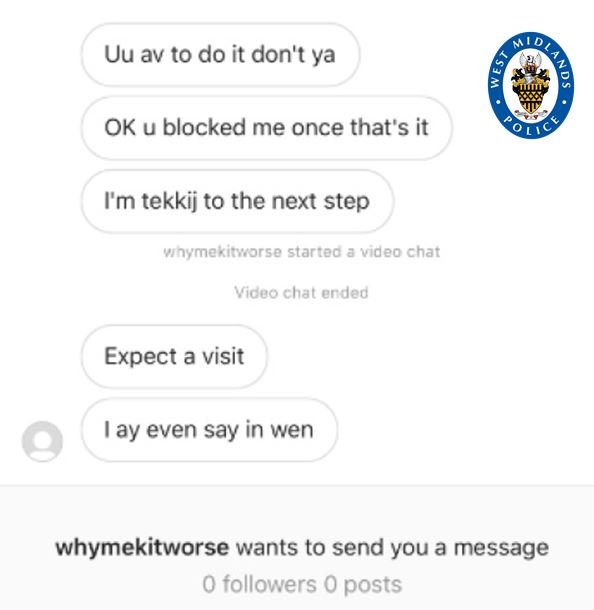A stalker who relentlessly hounded a woman – sending hundreds of threatening messages and even hacking into her home CCTV – has been jailed following our investigation.
George Coughlan created 19 fake Instagram accounts, plus other bogus social media profiles, to bombard the woman with abuse from December last year.
Chillingly, one of the messages he sent contained a video showing her relaxing at home in the lounge – and it quickly became evident he’d hacked into her home security camera system to seize footage.

Police arrested the 33-year-old on 29 February after the victim – who is known to Coughlan – disclosed the stalking and harassment to officers.
His phone was seized for examination and revealed internet searches on the woman’s name and her partner, plus phrases including “log into iCloud without verification” and “free mobile phone tracker without user knowing”.
And he’d researched phone spyware to track SMS messages, calls, social apps and GPS movements.
Police also found a total of 61 social media accounts linked to his phone – which he used to contact the victim – and 67 video files he’d downloaded after hacking into the CCTV system.

Coughlan, from St Chads Road in Bilston, Wolverhampton, initially denied one count of stalking involving serious alarm and distress but in the face of compelling evidence Police presented to the court later admitted the charge.
And on Friday (23 Oct) at Wolverhampton Crown Court he was jailed for 21 months. He was also made subject to a five-year restraining order in order to protect the victim.
Inspector Cate Webb-Jones from our Public Protection Unit said: “Stalking is a serious crime, an invasion of someone’s privacy, and as we’ve seen with this case can result in a significant jail term.
“Coughlan went to extreme lengths to exert control and intrude on his victim’s life. It was hugely upsetting and she was living day by day in fear. It’s simply not acceptable.
“Social media and easily accessible technology, such as spyware to track mobile phones, is giving stalkers more tools to harass victims and potentially put them in more danger.
“In the last year (April 19 to March 20) we saw reports of stalking and harassment rise by almost a third. Much of that is online offending and that trend continued during lockdown as people spent more time on social media.
“We don’t differentiate between people abusing or harassing others face-to-face or online: it’s still an offence and we will take action.
“We wish the victim well as she continues to rebuild her life following this traumatic experience.”
We ran a social media campaign this summer targeting online abusers that saw Instagram, Facebook and Twitter users receive inbox messages featuring artwork warning them “it’s easy to commit crime online”.
Insp Webb-Jones added: “Evidence suggests victims may experience dozens of incidents that amount to stalking, including receiving messages online, before reaching out to the police for help.
“We want people to contact us at the earliest opportunity if they feel they are being targeted.
“We will also push for Stalking Protection Orders (SPOs) against offenders which can come with conditions including banning them from the social media platforms they use to harass victims.”




